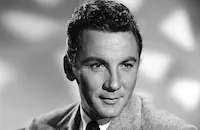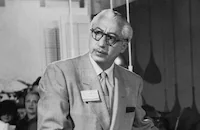The Sellout

Brief Synopsis
Cast & Crew
Gerald Mayer
Walter Pidgeon
John Hodiak
Audrey Totter
Paula Raymond
Thomas Gomez
Film Details
Technical Specs

Synopsis
As Haven D. Allridge, the well-respected editor of the St. Howard newspaper, drives home across the county line after dining with his daughter Peggy and her husband, county prosecutor Randy Stauton, he offers a ride to Wilfred Jackson, a man who sells sandwiches in his building. A few minutes later, Haven is stopped for speeding. Haven apologetically says that he left his license at his office, but when county sheriff Kellwin C. Burke arrives, he balks at Haven's "city" ways and orders him and Jackson to the county jail. After being denied a phone call, Haven refuses to give his name and is thrown into a large cell with prisoners who hold a kangaroo court, search him and take his pocket change. When they discover that Jackson has a hidden quarter, they beat him. In court the next morning, Jackson, who pleads not guilty to soliciting a ride, is held over thirty days for trial, while Haven is fined the $68.00 he had when arrested. A lawyer recognizes Haven as Randy's father-in-law and tells Burke, who pretends to be apologetic and releases him. Haven then goes to Randy asking him to do something, but Randy insists that his hands are tied and warns that Burke is dangerous. Haven decides to use his newspaper to sway public opinion and collects fifty-five affidavits from people who had been similarly mistreated across the county line. Burke retaliates by initiating ordinances against newspaper distribution in the county. When a newspaper truck driver is killed in a staged accident, police captain Buck Maxwell appeals to the state attorney general's office for help. Chick Johnson is assigned to the case, despite his protests that he is leaving for a better job. In St. Howard, Chick and Maxwell go to see Haven, but find that he has mysteriously left town and the affidavits, which were in a locked drawer, are missing. That night, Cleo Bethel approaches Chick in a bar. When Chick realizes that he is being set up, she admits that Burke hired her to "get friendly" and take him to Bennie Amboy's, one of Burke's hangouts. Chick later goes to Amboy's, where Cleo works as a singer. She introduces him to Nelson S. Tarsson, Burke's smooth lawyer, who obliquely offers a bribe that is rejected by Chick. The next day, Chick and Maxwell learn that all of those who signed affidavits against Burke have been frightened into changing their stories, and Chick suspects that Haven has also turned. Amboy is then questioned in Maxwell's office and is coerced into telling them why he called Haven late one night: Amboy telephones Haven and tells him to come to his place to hear "the lowdown" on Burke. Once there, Haven is offered a bribe, which he refuses, then one of Burke's henchmen beats him up and takes him into another room. Finishing his story, Amboy says that he has no idea what happened after that. A short time later, Haven returns to town and tells Peggy that he has accepted a job in Detroit. Peggy is suspicious and accuses him of caving in to Burke. That night, Chick urges Haven to testify at Burke's preliminary hearing the next day, but Haven refuses and Chick serves him with a subpoena. Feeling defeated, Chick tells Maxwell that there is no hope for the case, but Maxwell, who has faith in Haven, tells him not to give up. At his hotel, Chick receives a note from Amboy telling him that Cleo is in jail. When Chick goes to bail her out, he is told that she is not there, but he finds her, beaten, in a cell. He then gets into a fight with the guard and takes the key to her cell. As Cleo and Chick are about to leave, Burke arrives with Tarsson, who advises his client to let her go. Burke is angered and draws a gun, but when Maxwell arrives, Burke acquiesces. After seeing Cleo safely leave town, Chick goes to the hearing. He gets no information from Haven, but requests that he stay in the courtroom. Throughout the day Haven uncomfortably listens as the frightened witnesses recant their earlier affidavits. A surprise witness is Jackson, who is still in jail, and relates what happened after he and Haven were arrested. Chick next calls Amboy, but is told that his body has just been found. Chick then recalls Haven, who refuses to corroborate Jackson's story. Despite Chick's impassioned concluding argument, the judge has no choice but to dismiss the case for lack of corroborative evidence. Just before the decision is rendered, though, Randy comes forward and asks to question Haven, who still refuses to speak. Then Randy asks Peggy to stand up and reveal to the court that he himself had been at Amboy's the night Haven went there. Haven now reveals what happened after he was beaten: When he revives, he sees Randy in the room and is shown a cashier's check and other evidence by Tarsson that reveals Randy had suppressed evidence after the trucker's death. A remorseful Randy states that it was his ambition that made him do it, and Tarsson responds that Randy will be sent to jail for twenty years, leaving Peggy and her daughter alone. Realizing his price has been met, Haven acquiesces. Back in the courtroom, the documents are brought forth and the judge orders Burke to be held without bail until his trial. Chick apologizes to Haven, who thanks him. Jackson is then released and Chick decides that he wants to finish the job and stay with the attorney general's office.

Director

Gerald Mayer
Cast

Walter Pidgeon

John Hodiak

Audrey Totter

Paula Raymond

Thomas Gomez

Cameron Mitchell

Karl Malden

Everett Sloane
Jonathan Cott
Frank Cady
Hugh Sanders

Griff Barnett
Burt Mustin

Whit Bissell
Roy Engel

Jeff Richards
Vernon Rich
Bob Stephenson
Cy Stevens
Nadene Ashdown
Ann Tyrrell
John Damler

Frankie Darro
John Dierkes
Roy Butler
William Hamel
Cliff Clark
William E. Green

Dorothy Patrick
Dick Simmons
Jack Sherman
Robert B. Williams
Joan Wrae
Fred Graham
Richard Cramer
Harry Stanton
Mabel Smaney

Benny Rubin
Jack Daly
Robert Foulk
George Brand
Crew
Peter Ballbusch
David Buttolph
Joe Edmundson
Joel Freeman
Dave Friedman
Cedric Gibbons
A. Arnold Gillespie
Sydney Guilaroff
Floyd Huddleston
Ralph S. Hurst
Arthur Lonergan
Ruth Martin
Frank Mckenzie
Nicholas Nayfack
Charles Palmer
Matthew Rapf
Matthew Rapf
Al Rinker
Douglas Shearer
William Tuttle
Paul C. Vogel
George White
Edwin B. Willis

Film Details
Technical Specs

Articles
The Sellout (1952) - The Sellout
This is, in fact, one of those movies about corruption, extortion, crusading newspapermen, rough thugs, and shady nightclub "chantooses" that falls under the broad umbrella of noir. Neither Mitchum nor Ryan are in it, this being not one of the great examples of the style (witness its release date: dumped right after the holiday season in early January 1952), but it does have some of the players we've come to expect. First and foremost is that sloe-eyed, hard-as-nails noir fixture Audrey Totter, one of the best of the period's bad girls. A fascinating presence and much better actress than her longtime "B" status would indicate, Totter appeared in more than half a dozen films that roughly fall under the noir banner, among them The Postman Always Rings Twice (1946), Lady in the Lake (1947), and The Set-Up (1949), which did star Robert Ryan.
Others in the cast with recognizable faces but perhaps less familiar names are Thomas Gomez (Force of Evil, 1948; The Woman on Pier 13, 1949, with Ryan again), Whit Bissell (Raw Deal, 1948; He Walked by Night, 1948), and Everett Sloane (The Lady from Shanghai, 1947; The Enforcer, 1951).
The biggest name in the cast at this point in time was star-billed Walter Pidgeon, a longtime MGM contract player making the transition from Greer Garson's most frequent leading man (seven pictures between 1941 and 1950, with one more to follow the year after this) to the distinguished older gentleman of The Bad and the Beautiful (1952), Executive Suite (1954), and the Prospero-like character of Forbidden Planet (1956). Pidgeon plays the big-city newspaper editor set on bringing down a corrupt small-town sheriff (Gomez) who holds power over his entire community. When Pidgeon suddenly gives up his crusade (the sellout of the title), it's up to state's attorney Chick Johnson (John Hodiak) to uncover the depth of the shady dealings and set things straight. Did we mention Totter plays a nightclub "chantoose" who ends up on the wrong side of just about everybody?
The plot line, while distinctly contemporary to its time, also recalls a Western theme, a fact the New York Times review was quick to notice: "There is no reason why this picture cannot be called an 'Eastern.' We have a long tradition of 'Westerns' in which black-hearted cowboy villains, abetted by slick, well-dressed lawyers, are opposed by a clean-cut, chisel-jawed state or Federal Marshal who in turn is aided by a 'courageous journalist.' He uses his press to battle the elements of disorder and mischief, and you know who always wins. That is a standard Western, but an Eastern is slightly different. Instead of horses, the principals use late model autos, no wide brim Stetsons but snap brim soft hats, long barreled .44's are replaced by snub-nosed .38's to inter the squealer and incarcerate the crooks. Acting in a low level Eastern is identical with its brother in the West." The film's working title, "County Line," might have been an appropriate one for a true Western or, had this been made a few decades later, one of those movies where innocent young people cross into a nightmare rural world of murderous redneck sheriffs.
One of the good guys in this scenario is played by Karl Malden, just a couple of months shy, when this picture was released, of receiving his Best Supporting Actor Academy Award for A Streetcar Named Desire (1951). That movie would do much more for his career than The Sellout, although his role here as an honest cop would prepare him well for a character that, despite his many great screen performances, is probably his most recognizable to audiences, Detective Lt. Mike Stone of the 1970s television series The Streets of San Francisco. Malden was no slouch at film noir roles himself, having appeared in Boomerang! (1947), Kiss of Death (1947), and Where the Sidewalk Ends (1950).
According to a Hollywood Reporter story, Robert Walker was set to co-star in The Sellout, but he died tragically at the age of 32 from drug and alcohol use, and his role was taken by John Hodiak. Walker's last film, the anti-communist melodrama My Son John (1952), was released just a few months after The Sellout, a delay caused by rewrites and re-shoots after he died before production completed.
The director of The Sellout is Gerald Mayer, doing little to distinguish himself beyond his status as nephew of MGM studio head Louis B. Mayer. The bulk of young Mayer's career would be mostly spent in television, where he directed many episodes of both Western and crime shows, as well as several other genres.
Director: Gerald Mayer
Producer: Nicholas Nayfack
Screenplay: Charles Palmer, story by Matthew Rapf
Cinematography: Paul Vogel
Editing: George White
Art Direction: Cedric Gibbons, Arthur Lonergan
Original Music: David Buttolph
Cast: Walter Pidgeon (Haven D. Allridge), John Hodiak (Charles "Chick" Johnson), Audrey Totter (Cleo Bethel), Paula Raymond (Peggy Stauton), Thomas Gomez (Sheriff Burke), Karl Malden (Capt. Buck Maxwell).
BW-83m. Closed Captioning.
by Rob Nixon

The Sellout (1952) - The Sellout
Quotes
Trivia
Notes
The film's working title was County Line. According to a Hollywood Reporter news item, actor Robert Walker was to co-star in the film with Walter Pidgeon. Walker, who died in September 1951, completed his last film, My Son John, in spring 1951.















